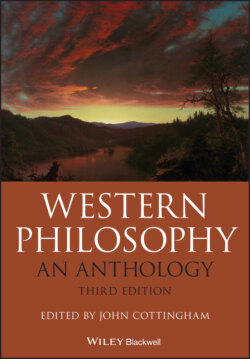Читать книгу Western Philosophy - Группа авторов - Страница 29
Assessing the Argument
ОглавлениеThe two components of a philosophy essay just referred to, exegesis and criticism, allow you to demonstrate two important skills. Exegesis requires you to show scholarship – the skill of carefully, conscientiously, and accurately expounding the key points in a text. Criticism requires something rather different, the ability to reflect on the text, engage with it, and develop your own carefully reasoned response to it. But what exactly is it that we are expounding and criticizing? To answer ‘the text’ does not get us very far. A historian’s text may be a manuscript or other documentary record, which is examined for accuracy and authenticity. A literary critic’s text may be a novel or a poem, which is examined for style, or imagery, or compositional technique. But what a philosopher is for the most part doing in scrutinizing a philosophical text is assessing the argument.
The term ‘argument’ in this context does not of course have the meaning it often has elsewhere, namely that of a dispute or disagreement (though there are plenty of philosophical disagreements); it refers instead to a process of reasoning. As so often in philosophy, the idea goes back to Plato, who put what has become a famous phrase into the mouth of Socrates: ‘wherever the argument, like a wind, tends, there we must go.’1 Being blown about by the wind may seem a random or haphazard process. But Plato’s point in saying that we ‘must’ go in a certain direction is not that are passively forced along a given path, as being blown along by a gale might suggest. Rather, he means that there are certain constraints that determine what it is to follow a valid line of reasoning, constraints that we are required to follow, like it or not. To be sure, we may not in actual fact always observe those constraints in our thinking: people often make mistakes in argument and reason badly. But there is nonetheless an authentic way, a way we ought to go, a way we can on reflection recognize as valid, independently of where we might like to go. To borrow another metaphor, used many centuries later by the German logician Gottlob Frege, the laws of logic could be said to be like boundary stones which our thought ‘can overflow, but not dislodge’.2
The Greek word for ‘argument’ is logos, from which we get the English word ‘logic’. A good argument is not just a series of thoughts, but a logical sequence, where the final step or conclusion follows logically from what has gone before. An argument is said to be valid if, once you grant the truth of the premisses (the assumptions or starting-points of the argument), the conclusion must follow. Thus, in a time-honoured example, if your two premises are that (1) all humans are mortal, and (2) that Socrates is human, then it follows that (3) Socrates is mortal. This very strong form of argument is called a deductive argument, meaning that the conclusion can be logically deduced from the premises. And this in turn means that anyone who accepts the premisses has to accept the conclusion on pain of contradicting themselves.
To assess a deductive argument, you have to do two things. First you have to assess whether it is valid: does the conclusion follow as a matter of logical inevitability from the premisses? This is a purely formal matter, and in many cases it can be quite straightforward. In the above example about Socrates being mortal, the form of the argument is, ‘if all As are B, and x is A, then it follows inevitably that x is B’. This pattern or reasoning is universally valid whether we are talking about Socrates and mortality, or any other objects or properties whatever; so if all swans are white, and Fluffy is a swan, it follows that Fluffy is white. Notice, however, that although this latter argument is perfectly valid, just as in the Socrates case, its starting point is questionable. Few if any of us would concede the first premiss (that all swans are white), since we know that there have been cases of black swans. So validity in argument is not the only thing that matters. We want our arguments to be valid, but we also want the premisses to be true. And only then will we say that the argument is not just valid but acceptable or sound: the premises are true, and the conclusion logically follows. Often in philosophy some of the most interesting questions arise not about the validity of an argument, but about whether the premisses are true.
So although formal logical skills are important in philosophy, they are not the whole story. Indeed, philosophical arguments, as they occur in the great canonical texts, are very seldom set out in simple deductive patterns like that in the Socrates example just mentioned. The arguments are generally more complex, and they have to be extracted from the flow of the writing, with the implicit premises teased out and examined, and the possible vagueness and ambiguities scrutinized. And in deciding whether a given premiss should be accepted in the first place, one often has to reflect carefully on just exactly what is being claimed, and what implications it has for the rest of one’s worldview.
